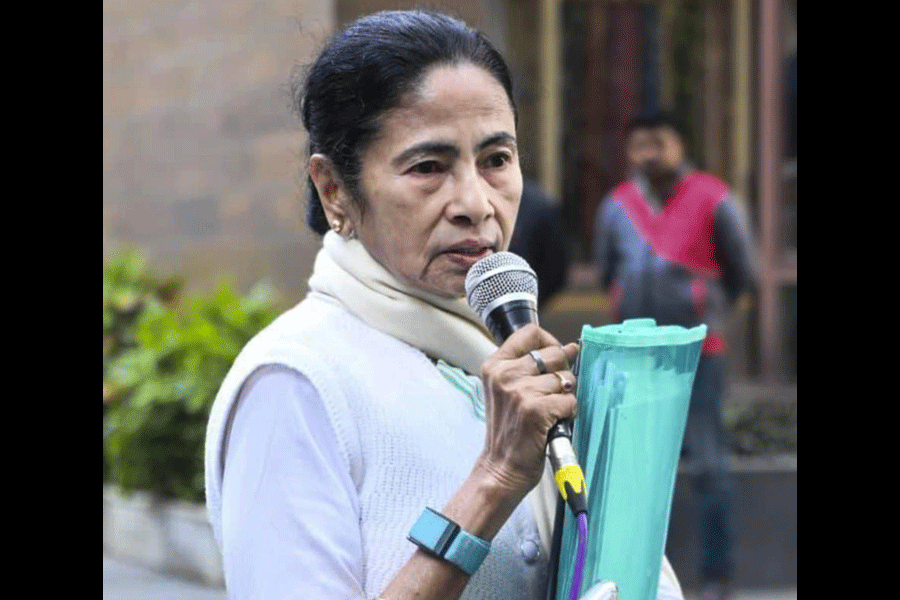 |
| The vigilance bureau headquarters in Ranchi |
Ranchi, Feb. 27: Crime-busters or file-pushers? Jharkhand vigilance bureau, in its internal report, has admitted that deputy superintendents of police (DSPs) are too few in number, with some so incompetent that they can’t write a dairy or so slow that they haven’t moved an inch in their investigations in six months.
The damning report, a copy of which is with The Telegraph, has been prepared by high-level bureau officials for governor Syed Ahmed and cabinet (vigilance) department that monitors corruption cases against government officials.
The report has made candid observations of poor quality and speed in investigations, a situation worsened by too few DSPs. It lists lapses that range from the silly to the serious.
For instance, DSP Ashok Kumar Singh of the bureau can’t write a case diary. Two others, Renu Bara and Anup Kumar Hembrom, despite repeated warnings from seniors in the past six months, haven’t made any progress in probing scams.
Though the bureau sought Singh’s transfer twice, in April and August 2012, nothing happened. Singh, scheduled to retire in June 2013, perhaps couldn’t care less.
“It seems nobody wants to serve here as the bureau isn’t a plum posting. We are burdened with major cases but everyone drags their feet,” said a top vigilance officer.
The bureau also sought “immediate transfer” of Bara, probing into the alleged recruitment scam of AYUSH (Ayurveda, Yoga & Naturopathy, Unani, Siddha and Homoeopathy) medicos through competitive exams, and Hembrom, in charge of the Ranchi land scam case, on the grounds of “minuscule contribution” to investigations.
Currently, the bureau is investigating 64 different cases and conducting 187 inquiries. Barring a couple of cases, including one involving former agriculture minister Nalin Soren accused of financial irregularities and funds misuse amounting to Rs 46.10 crore, the bureau has not made much progress.
In the AYUSH case of 2009, the bureau has not been able to arrest one Ramesh Singh, the key accused in fudging results.
Lower down in the pecking order, many inspectors in the bureau are still learning the ropes of Prevention of Corruption Act (1988) though the home department empowered them last year to tackle cases under it as there were too few DSPs.
“I am not calling any individual incompetent. But the bureau can’t afford to keep those who can’t work. We have requested department to transfer them,” DG (vigilance) Neeraj Kumar Sinha told The Telegraph.
SP (vigilance) Ranjit Kumar Prasad, however, had a diametrically different view.
“In the past three months, we have made remarkable progress in the investigation of cases. We have started periodic reviews of cases. We have a manpower crunch. You can’t expect matters to change overnight,” he said.
He also had a point. Against 27 sanctioned DSP posts in the bureau, only 12 exist. In 2013, the number will reduce, as three serving DSPs will retire by June-end.
In the mess, some genuine feats get eclipsed. In the last 10 months, the bureau registered 32 successful “trap cases” and arrested 37 bribe takers. In over nine months, it recovered close to Rs 24 lakh in cash, including Rs 5.77 lakh in sting operations, a huge leap from Rs 60,800 last fiscal. But manpower crunch foiled much headway in these cases.
Principal secretary (home) J.B. Tubid, who heads the cabinet (vigilance) department, was unavailable for comment.
A DSP, who did not want to come on record, said lack of infrastructure had a bearing on the efficiency of even those who wanted to work. “Some cases are so huge and complex that they have to be split into separate components each under the charge of a DSP. But where are DSPs?” he asked, a question that Jharkhand High Court had raised in 2012.
However, DG (vigilance) Sinha sounded hopeful. “I believe some 50 police officers of inspector rank in Jharkhand will be promoted to DSPs. The government has assured us that it will fill up vacancies soon,” he said.










